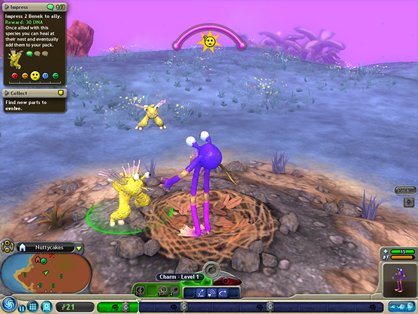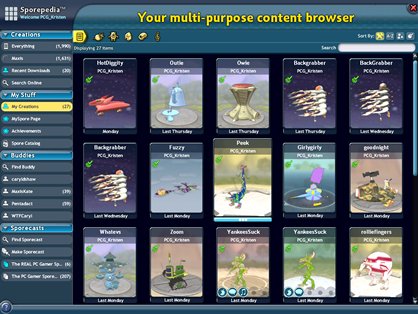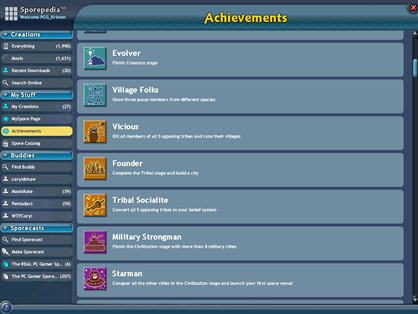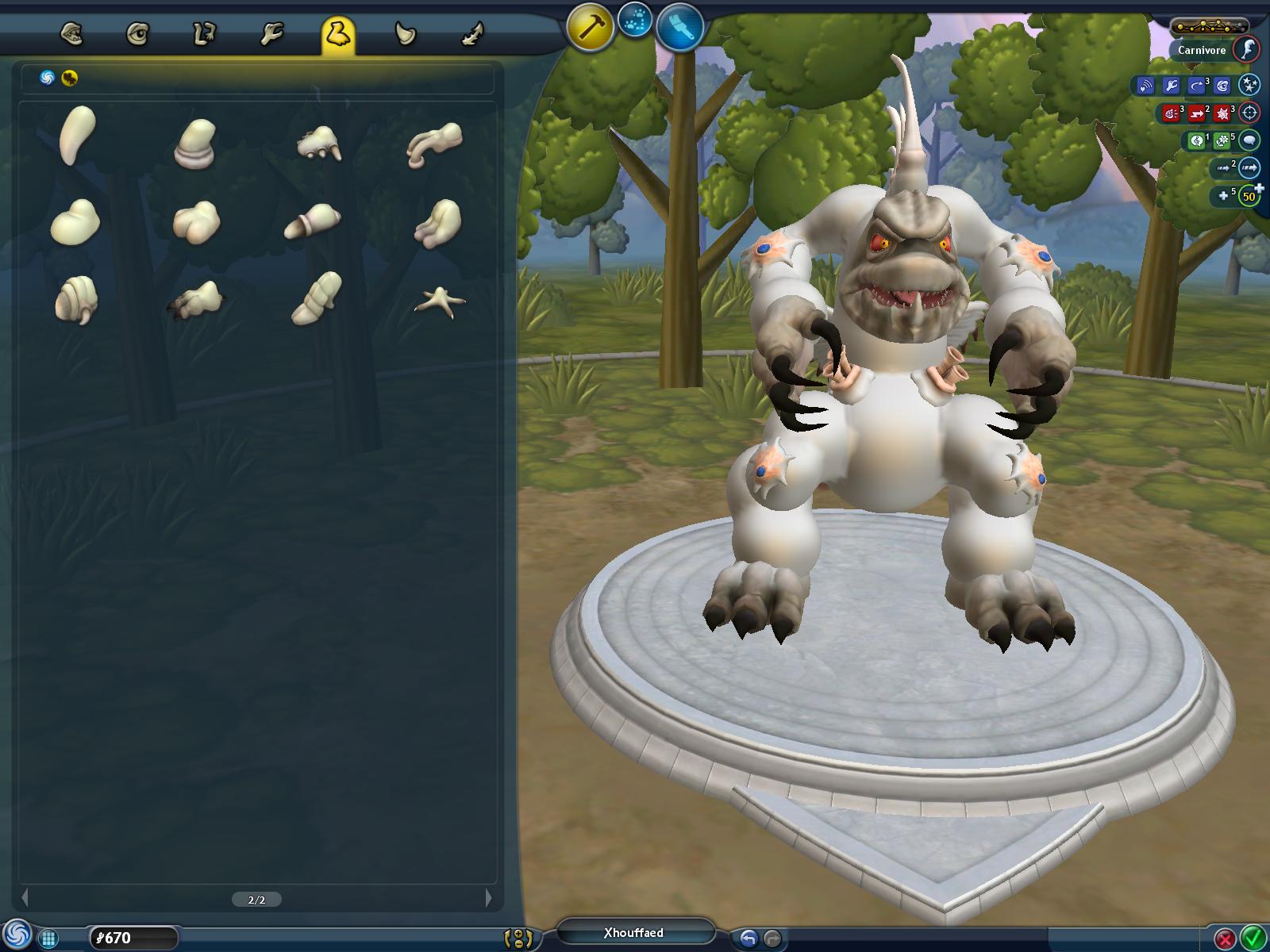Why you can trust GamesRadar+
WHAT TO DO, WHAT TO DO?
That’s not to say that I think you made something overly simplistic. I mean, just consider Spore’s opening screen, where three ostensibly simple verbs—Play, Create, Share—are doorways to a dizzying array of 30-plus options ranging from playing the game to adding specific accessories to creatures. After the first time you “Play” through the five more-or-less linear game phases in order (Cell, Creature, Tribe, Civilization, Space), you never need to play them again. Or you can play some over and over and never play others. Or you can play them all repeatedly, but in different ways. Or you can just play with the “Create” tools (creatures; buildings; air, land, and sea vehicles of military, economic, or religious varieties; spaceships) and then “Share” what you’ve made in the Sporepedia, so other people can import it into their game. Or you can play without ever creating anything, instead importing what other people have created and playing with that (although you don’t ever play with other people—their work populates your game world if you turn that feature on, but the server just sucks that info down and then leaves you in peace).

Above: In Creature phase, make allies by copying their actions
I can see you’ve never suffered from options paralysis, Will. And heck, who knew that I did? But it turns out that I’m used to a game telling me what to do—where things are, how things work, what order to do things in, how doing something will affect something else. And when I didn’t initially find that in Spore…well, I felt kinda lost. Even in the Create section (which is where I decided to start before tackling the Play section), I felt overwhelmed at first. Every creator and sub-creator offers different parts to work with, and because I knew I’d be using my creations when I did eventually play the game—or that someone else could import them into their games—I was concerned about whether I was building “useful” items, whether I needed to be aware of how different parts affected my creations’ in-game effectiveness. Was I putting too many claws and not enough big guns on my Backgrabber spaceship? Was Peek, my L-shaped stripy creature with a vertical row of eyeballs and a jaunty three-cornered hat, well-equipped for survival in a religious civilization? Why is the Sporepedia already filled with creations that look like crafted works of art while mine look like I failed LEGOs in kindergarten? Where is a tutorial telling me the “right” way to do this?
And then I realized: games have tutorials. Toys don’t. Kids don’t consider the “right way” to play with a toy—they just amuse themselves with it.
Well, I can tell you, Will—that was an eye-opener. I quit worrying about whether all of the windows on my City Hall were equally spaced apart. I stopped trying to re-create a picture-perfect SpongeBob SquarePants creature. I just…played.
I now understand that this is the crux of enjoying Spore: just play, and not only when you’re using the creators, but in the Play phases, too.

Above: The Sporepedia lets you browse your own saved creations, or those others have uploaded. It's like a biological automat
You’re probably wincing when I tell you that I approached the Play phases—the actual “game,” so to speak—expecting gameplay that matches the depth of Spore’s evolution concept. Because let’s be honest with each other, Will—you and I both know that Spore’s actual gameplay mechanics are elementary, and that for anyone with a modicum of videogame-playing experience, they’ll get very repetitive very quickly. The Cell phase is basically Pac-Man without walls: steer your creature around obstacles toward power-ups. Creature and Tribe phases are Simon Says with hotkeys to ally with other creatures or tribes (by hitting the right keys at the right time) and “RTS for Dummies” to conquer them (right-click to target and attack). Civilization phase amounts to an Age of Empires tutorial (although apparently, experienced strategy gamers are having a hard time with some of it—Dan Stapleton wrote you a little note about it at the end of this review). Even Space phase (which is my favorite, for reasons I’ll explain in a minute) is, at its core, MMO-lite: missions amount to killing five meanies in a set amount of time, fetching a prize in classic FedEx style, or hunting for loot to collect or sell.
I’ll be honest, Will: given that Spore is the most anticipated game of the last however-many years, the sheer simplicity of these play modes was very unexpected. But here’s the thing—and I bet you saw this coming, Mr. Genius Comedy Central Guest: mini-games are fun. Pac-Man is fun. Casual games are fun, especially when they’re set in a humorous, pretty world full of visually fascinating, often giggle-inspiring creatures. And once I understood that Spore’s gameplay mechanics were never going to rise above the very basic—and that what I’ve been expecting of Spore is not what Spore is trying to be—I had a damned good time. This isn’t a game that rewards you for your ability to beat a game, but rather one that rewards you just for playing. In fact, I’ve played about 30 hours of it in the last week alone, mostly in two-hour stretches.
“Aha!” I bet you’re saying. (Or maybe you’re more of a “Eureka!” guy.) “Very good, Kristen. You have realized that Spore is not a game meant for PC Gamer readers to play in 6-8 hour stretches, because while it may have lots of pieces to it, those pieces are the equivalent of casual games or digital sandboxes. They’re toys, pleasant diversions. And since each of them can clearly stand alone, EA is about to employ some sort of brilliant business model that will monetize them individually and make me a metric ton of money!”

Above: Don't be shy - have a look around. Spore loves to reward you with its many play options
I guess that sounds a bit snarky (and of course I have no idea what, if anything, EA plans to do with Spore’s pieces, but if they haven’t mentioned anything to you, you might want to float the idea by them). Sorry—I didn’t mean for it to, especially since I hope that lots of people will play Spore. It may not be a PC-gaming revolution, but I do think it could lower the barrier to entry that keeps many people from committing to anything more than just casual games. Because each of Spore’s parts is so accessible, and because an overarching theme ties them together, I can see people “graduating” from one game phase to the next, growing more comfortable with the idea of doing multiple tasks at once, and then before they realize it, they’re checking out StarCraft II some really grognard-y EA game like Red Alert 3.
I just wish Spore was a little more… communicative, I think is the word I’m looking for. I actually described it to someone as “undertutorialized,” by which I meant that I spent a lot of time trying to shape outcomes, seemingly to no ultimate effect. That’s all right when you’re not specifically pursuing a goal, but it’s awfully frustrating when you are. For example, in the Tribe phase, I sometimes failed to ally with other tribes, despite repeatedly re-entering the creature creator and making changes that seemed like they should have increased my allying skills (sing, charm, dance, and mime “ta-da!”). The changes didn’t seem to make a difference. I was just as confused by the Evolution History screen that tracked the cultural traits of my evolving civilization—friendly, industrious, or aggressive—because by the time I reached the Space phase, none of those traits seemed to matter. Do certain parts make one spaceship more effective in battle than another? I can’t tell. How can I get the most out of the Sporepedia? I once saw you demonstrate using it to import only yellow creations into your game—how did you do that? I couldn’t figure it out. And while I’m on a roll, where’s the autosave?
More info
| Genre | Strategy |
| Description | SimCity creator Will Wright is creating his most ambitious simulation ever: one for the entire universe. |
| Platform | "PC","Xbox","PSP","DS","PS2","Xbox 360","PS3","Wii" |
| US censor rating | "Everyone 10+","Everyone 10+","Everyone 10+","Everyone 10+","Everyone 10+","Everyone 10+","Everyone 10+","Everyone 10+" |
| UK censor rating | "Rating Pending","Rating Pending","Rating Pending","Rating Pending","Rating Pending","Rating Pending","Rating Pending","Rating Pending" |
| Alternative names | "Spore Creatures (DS)" |
| Release date | 1 January 1970 (US), 1 January 1970 (UK) |



